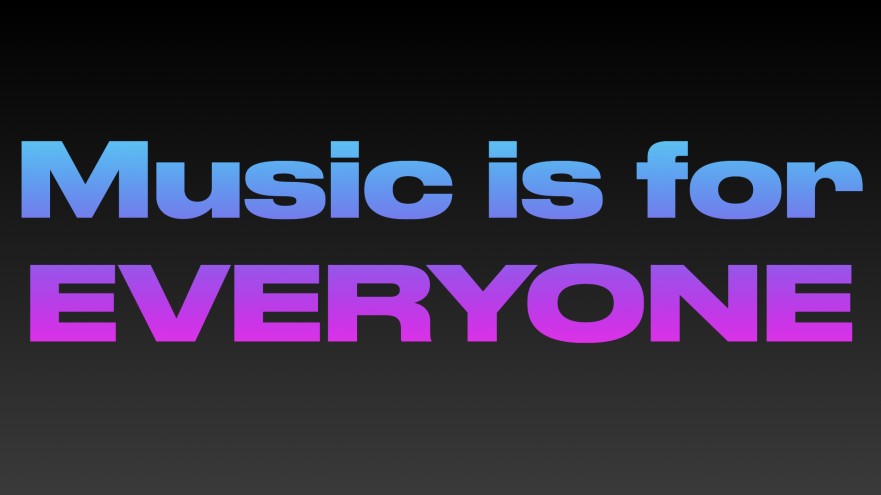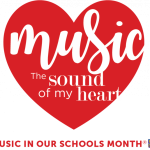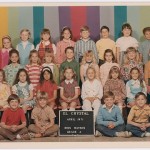“Music education opens doors that help children pass from school into the world around them – a world of work, culture, intellectual activity, and human involvement. The future of our nation depends on providing our children with a complete education that includes music.” Gerald Ford
March is Music in Our Schools Month. I’ve written about music education frequently. Some of the posts on this site are Building Relationships , Act 1, Scene 1, Buzz, Buzz, Buzz, and Music, Math, and Reading-OH MY!
Right now, I am thinking about how music is universal is to all people.
There seems to be an overall idea that music is for some people, but not for everyone. Some comments I have heard are:
- I was told in school not to sing.
- Deaf kids don’t need music class.
- We didn’t have music at my school.
- I think music is important, but we have to focus on these test scores.
I’ve been teaching long enough to remember life before high-stakes standardized testing. We taught using integrated thematic units. Every subject was somehow tied into a theme. If we were learning about winter, math, reading, social studies, science, music, art, and PE all had elements tied to that theme. It was easier to make the connections between subjects because the theme tied them together. I loved the collaborative environment this fostered in schools. No single subject was MORE essential, and the main focus was developing students into critical thinkers who collaborated and worked well together.
I stepped away from full-time school-based teaching in 2000, just as high-stakes testing was becoming the norm. I continued teaching music in a private studio setting and contracted with a few early childhood centers and one special needs program. Some of the observations I made during this time surprised me and continue to impact how I teach today.
I saw parents come into my toddler class with their child and find a singing voice. There were no performance expectations, just to be fully present. They relaxed, learned new ways of playing with their child, and learned to sing themselves.
I heard countless stories from parents about how their child wouldn’t participate during class but sang all the time away from class. They were busy soaking up music in class so that they could reproduce the joy when they left.
One fascinating observation that I made during this time was the impact of musical experiences on children that seemed unresponsive in other environments. I contracted with a local public school to bring music to a self-contained special education class once per week. This class was housed at a mainstream elementary school that was staffed with a music specialist, but for some reason, that teacher did not work with these students.
For about the first month, I wondered if I was having any impact at all. Then I noticed the students immediately start a clean-up routine and come to the carpet when I entered the room. They knew what was going to happen and wanted to be part of it. The behavioral specialist told me that they noticed a significant decrease in aggression leading up to the time I was coming and several hours after my visit. Toward the end of the first semester, I noticed students singing with me. They had responded to music through movement and beat keeping, but singing was new. These students were non-verbal or had emerging verbal skills. I did not expect them to sing with me. It was the most magical experience.
As I was preparing for this blog, I wanted input from teachers and parents on how their students responded to music. I posted in several places on social media and received some great responses:
- Non-verbal children who sing when they cannot talk.
- Children who have a speech impediment but can sing in a choir.
- The calming effect of listening to music or playing an instrument for adults and children diagnosed on the Autism spectrum.
- Children who have little interest in social activity openly showing interest in music activities.
- “My students with special needs LOVE music! One of my nonverbal students lights up playing different instruments. While the student can’t always copy a rhythmic pattern on an instrument, we recently discovered he can do so with his foot! It’s a completely joy-filled experience teaching these students and seeing them shine.”
- “I taught a hand-drumming class based on the World Music drumming curriculum. I taught a self-contained life-skills classroom, and it was geared to be a mentoring situation where several mainstream students mentored the class. It was amazing! Anti-bullying, leadership….so many amazing things learned! The second semester, those students stayed in class and became the mentors for the new group. It was my favorite portion of the day!”
Performance is an integral part of a comprehensive music program, but please remember that we contribute to forming the future of humanity. Music-making develops these growing humans in ways that we don’t see in performances, but it is vitally important to their development.
It’s Music in Our Schools Month. How will you show appreciation and support for this vital part of a child’s education?










Comments 1
I’ve always agreed that cutting music, art, PE, etc. was a huge mistake. But these days, mostly on bike-rides, I’m listening to more music than ever and realizing anew what a beautiful thing music is. And to willingly take it away from children to suit adult ends is a travesty. Thanks for this post.